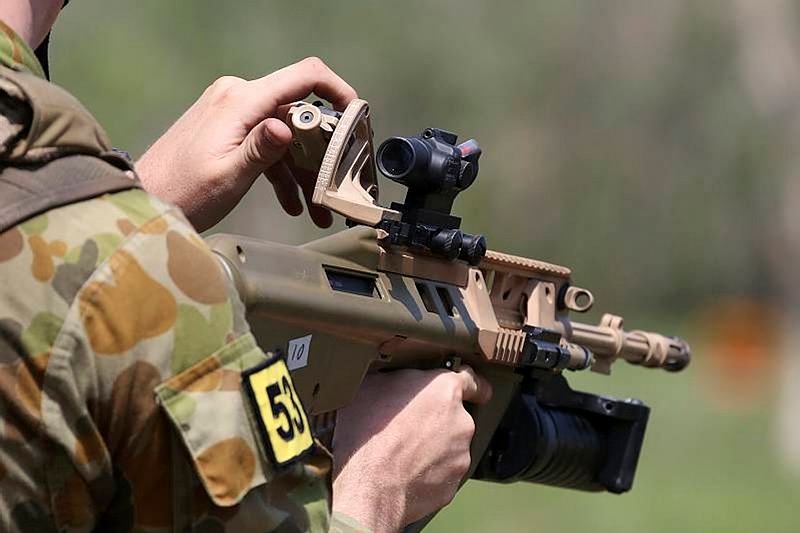I am a senior warrant officer who has been fortunate to serve in an Australian Special Forces unit for over 25 years, including more than 13 years in combat roles, and, most recently, as head of my unit’s combat and firearms training program. I’m writing this because I respectfully disagree with John Coyne’s recent assessment that the EF88 (the designation of the rifle in Australian Army service, not ‘F90’ which refers to Thales’ export version) ‘seems to make perfect sense’, when compared to the M4/AR-15.
I’ve had the opportunity to fire the EF88 and while it’s an improvement on the current Steyr, it’s definitely not a good combat weapon. The Steyr has many aspects that are less than desirable—some I will discuss below—but I’ll acknowledge that for the majority of the Australian Defence Force, it’s adequate for self defence. However, for our combat soldiers (not just Special Forces) we could do a great deal better.
Like John, I’m also not advocating any particular weapon system, but to say that the AR platform is reaching its end of service is inaccurate. The industry surrounding the AR based platform is a multi-billion dollar giant and the level of innovation and refinement that continues to go into this platform is unprecedented. Just one example will have to do—Sig Sauer recently launched their MCX rifle, an exceptional weapon that’s at the cutting edge of combat rifle design, yet is still based on Eugene Stoner’s original AR-15 design.
In contrast, other than our own efforts with the EF88, there’s no significant investment in developing the Steyr platform, and the list of nations that are now ditching this weapon and instead choosing AR-based weapons grows longer every day, New Zealand and Malaysia to name two. I believe where we can, that we should produce or make military items within Australia—but not at the expense of capability for the soldier. If we take the positive step of diversification, I’m sure Australia could produce more than one assault rifle and possibly create more jobs. That way we could supply our combat soldiers—Infantry and Special Forces—with a better combat weapon system.
What was once thought to be the best way to do business—ideas reflected in John’s piece—is, in many respects, not in line with current training in combat shooting. Our current training, built on the lessons of recent combat operations, exposes a number of significant shortcomings in the Steyr’s design. I’ll just mention three: fixed length stock/butt, the bullpup design and poor capability to fire offhand effectively. (I don’t have space to cover cocking handle, trigger, height of sight above bore, no free fall magazine and safety catch.)
My current role allows me to conduct training with soldiers from around the Army and a major problem is the fixed length butt, which affects soldiers who are smaller or taller than the average height. It’s difficult for them to achieve correct eye relief (even with the new extended Picatinny rail on the EF88), correct weapon position in the shoulder is also difficult, and fore grip position is suboptimal, all of which lead to ineffective application of fire.
Another problem with the Steyr is that it’s a bull-pup system. While this results in a shorter overall weapon length, this advantage creates a range of problems. For one thing, the placement of the magazine at the rear of the Steyr means that—unlike the M4 we employ in Special Forces—soldiers must look down when conducting stoppage drills. This is problematic as it involves a loss of situational awareness of the battle space—a far more significant concern than John’s worry about the need to hit the forward assist on the M4/AR-15 when addressing a stoppage.
Finally, for today’s modern combat soldier, having the ability to keep oneself behind cover as much as possible, while still being capable of returning effective fire at the enemy is critical. It’s really quite simple to train off-handed shooting if the weapon is capable of doing so effectively—which the Steyr, including the new EF88, isn’t. After less than one day of training with the M4 we have our soldiers shoot LF6 both strong and off hand and all soldiers can achieve this within two or three attempts.
In summary, there are more suitable combat weapon systems than the Steyr available for our combat soldiers, weapons that will provide greater lethality and survivability. Where lives are at stake, Defence must maintain integrity and focus on capability above all else.


